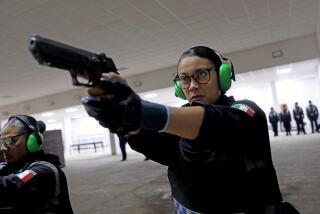Understanding Argentina: Rebels Symbolize Six Decades of Instability
BUENOS AIRES — “Argentina is a political enigma I cannot come to terms with,” said French sociologist Raymond Aron. It would take a profound study of Argentine history to reveal the causes of political instability the country suffered from during the last decades, Aron stated.
Political violence, from the recent military rebellions back to the dawn of independence, has been a constant component of Argentine history. After national unity was secured in 1860, with a U.S.-inspired constitution in force, the autonomy of the executive, legislative and judicial branches, as well as individual rights and guarantees, were slowly and gradually consolidated in Argentina. There were occasional social revolts, military insurrections and political disturbances, but for almost 70 years changes in government power took place as prescribed by the constitution.
In 1930, Gen. Jose F. Uriburu, an ideological devotee of Fascism then flourishing in Europe, ended this precarious republican tradition by overthrowing President Hipolito Yrigoyen and plunged the country into a state of institutional instability from which it has not emerged.
Uriburu and his successors, through the era of Juan Domingo Peron, overemphasized state power in Argentine society. The result has been a drastic reduction in private enterprise and in the rights and individual guarantees of citizens.
Peron added two innovations that remain today.
Inspired by the Fascists, Peron--who never hid his sympathy for Benito Mussolini--incorporated a bureaucratic new brand of unionism to the provident and all-powerful leviathan state. The second and more lasting Peronist innovation was the creation of a gigantic propaganda disinformation machine, through control of the mass media. These Peronist contributions to Argentine institutional disorder were maintained intact through various de facto and constitutional regimes. An unquestionably “democratic” president like incumbent Raul Alfonsin has developed them further instead of doing away with them, noxious as they are for the health of the republic.
Alfonsin is a lawyer who graduated with qualifications similar to those of U.S. Vice President-elect Dan Quayle. Blessed through inheritance by personal wealth, he never had to work for a living. (Some opponents say one cannot expect a man who never worked before being elected to begin working now as president.) Alfonsin has never been a professor of anything, has never carried out any academic research; his “intellectual” production consists of a small collection of articles inflated with party rhetoric. His law office, open sporadically, lacked any professional relevance. He dedicated himself to cases that benefited his political leanings.
Alfonsin has friendly dealings with the communist dictators of Cuba and Nicaragua. His pro-Soviet foreign policy is carried out by his traveling chancellor, the picturesque Dante Caputo. Alfonsin is a leader of a confused leftist ideology mixed with an inherent pragmatism of wanting to do business--more for his party than for his country--with capitalists who are either uninformed or in league with him. His efforts during more than five years in power have been overwhelmingly characterized by nepotism--about 50 members of the Alfonsin family and its many relatives hold prominent public posts, and by numerous propaganda trips abroad in company of a princely retinue, along with abundant administrative irregularities, some of which are now under investigation as possible crimes.
In a recent declaration, the Catholic bishops of Argentina summarized Alfonsin’s efforts of the last five years:
“The idolatry of money in our country today leads a few toward insolent gluttony and asphyxiating consumerism, and many more, toward prostitution and shady business deals, ill-gotten gains and favors. At the same time, the scandal of misery and poverty in the large marginalized population, the unemployment, the loss of a true love of labor, the falsity of the gambling adventure, the anguish and the hopelessness of the present, the fear of the future are witnessed and ignored.”
The current conflict between the military sector--much greater than that reported by the international wire services--and Alfonsin’s government is the expected bitter fruit from this campaign of political loss of prestige, economic degradation and moral defamation. It has been carried out by the president and his closest collaborators, against the institution of the armed forces. They have used, as a pretext, the crimes committed by a small percentage of the military--something like 10% of the active forces--during the so-called “state terrorism” era of the late 1970s and early ‘80s.
It is clear that given his background and ideology, Alfonsin could not be content with constitutional precepts for bringing members of the armed forces to justice. He has chosen instead to continue to issue decrees “a la Argentina, “ that is, illegally and unconstitutionally. He replaced the tribunals established by the National Magna Carta to judge the crimes committed by the military and staged farcical trials void of meaning, a fact affirmed by eminent Argentine legal and constitutional scholars. To accomplish this, Alfonsin counted on a compliant Legislature and on a Justice Department that he restructured under the yoke of the executive branch. Peron proceeded in precisely the same way during his “constitutional” periods.
Peaceful citizens, the majority in this country, have been involuntary witnesses, metaphorically, to the horrible crimes committed on behalf of the subversive Marxist movement and by the state terrorism that repressed it. While I and most citizens may not have been aligned with one or the other, we nevertheless are not outside the community in which these aberrant deeds were committed. We surely did nothing to perpetrate them, but we also lacked the necessary force to stop them. Similarly, some have implicated all German citizens in the Nazis’ rise to power.
We are all, to a degree, accomplices of the atrocities committed by terrorists and for the terrorism that repressed them. The military and the surviving captured guerrillas say that they need amnesty. We understand that. We all need amnesty. Raul Alfonsin also needs it, especially if he wants to complete his hazardous and depressing “constitutional” period in peace.
More to Read
Sign up for Essential California
The most important California stories and recommendations in your inbox every morning.
You may occasionally receive promotional content from the Los Angeles Times.










